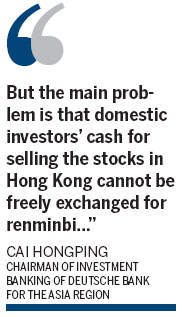
China's top securities regulator will introduce policies to allow all shares of Hong Kong-listed mainland companies to be traded in the overseas markets, an official from the China Securities Regulatory Commission said on Monday.
According to the existing Chinese regulations, the locked-up shares held by domestic investors in those companies - the State, the domestic institutions, the management and so on - are restricted from trading in the overseas markets.
The would-be change would make the mainland companies listed in Hong Kong "companies of all-tradeable shares", as they are called by the Chinese press.
"The current restrictions come from existing laws and special regulations regarding Chinese companies that have plans to issue IPOs overseas, but we hope to solve the problem soon," said Tong Daochi, director-general of the international affairs department at the CSRC.
Hong Kong-listed mainland companies' shares held by domestic investors, especially the State-owned ones, currently cannot be traded in the H-share market, except for a few cases that were approved by the State Council, the country's cabinet.
The restriction on the shares' "full circulation" has limited the market value of the Hong Kong stock market and restrained refinancing for listed companies.
The original plan to limit domestic shareholders' trading was to ensure control of public companies and to stem massive cashing in of the stocks. But the framework can no longer adapt to market requirements, analysts said.
With the restrictions removed, more foreign capital will be invested in Hong Kong, and further opening-up of the mainland securities market will be promoted, they said.
Hong Kong Exchange Chief Executive Officer Charles Li said in November that difficulties in starting the "full circulation" would be solved by improving the policy design.
But the speed of the improvements won't have much of an impact on domestic companies that plan to issue shares in Hong Kong, he said.
Cai Hongping, chairman of investment banking of Deutsche Bank for the Asia region, said there are fewer legal barriers to freely trading the domestic holders' shares in the H-share market.
"But the main problem is that domestic investors' cash for selling the stocks in Hong Kong cannot be freely exchanged for renminbi under the current control of the foreign exchange regulator," said Cai.
The CSRC has eased the requirements for financial documentation for mainland enterprises applying for IPOs in Hong Kong.
In days to come, "the commission will improve policies to encourage qualified mainland companies, especially the small-scale ones, to directly list on the Hong Kong market," Tong said.
By the end of 2013, 185 mainland companies had issued IPOs overseas, and 182 companies were listed on the Hong Kong.
